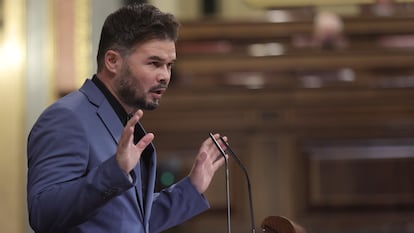Spain’s PM tells parliament there will ‘never’ be an independence referendum in Catalonia
Pedro Sánchez faces skepticism a day after meeting with the Catalan premier and a week after releasing nine pardoned leaders of the 2017 secession attempt
A week after pardoning nine jailed leaders of the 2017 unilateral secession attempt in Catalonia, Spanish Prime Minister Pedro Sánchez on Wednesday assured parliament that there will “never” be a legal independence referendum in the region.
“There will be no referendum on self-determination. Ever,” the Socialist Party (PSOE) leader pledged before a belligerent opposition that was quick to note he once said there would be no government pardons, either.
Sánchez sought to convince lawmakers that his recently renewed dialogue with Catalonia’s separatist government will not lead to any deals that fall outside the framework of the Spanish Constitution. A referendum in just one part of Spain’s territory would require legislative changes backed by three-fifths of the Congress of Deputies, or 210 out of 350 seats. “And the PSOE will not support that. Never, ever,” said Sánchez.
The statement came a day after the Spanish leader met with Catalan premier Pere Aragonès to lay out the groundwork for what Sánchez hopes will be a new period of regular talks between Madrid and Barcelona following years of frosty relations.

On October 1, 2017 the separatist government in Catalonia held an outlawed referendum in defiance of the courts and followed it up with a unilateral independence declaration inside the regional parliament. The Catalan premier at the time, Carles Puigdemont, fled Spain to avoid being tried for these events and has since been living in Belgium. Twelve other leaders of the failed breakaway bid were tried, and nine were sentenced to prison terms of nine to 13 years in October 2019. Three more were barred from holding public office and have already served their sentences.
At a highly anticipated parliamentary debate, Sánchez on Wednesday defended his government’s recent decision to release these leaders, invoking the same “spirit of concord” that facilitated Spain’s transition to democracy in the late 1970s following decades of dictatorship under Francisco Franco.
He said the act of clemency was meant to open up a new period and restore frayed relations between Madrid and Barcelona. “The time has come to do politics and leave behind these sterile and painful years. What we cannot do is shift our own political responsibility on to the courts,” said Sánchez, who was heavily criticized in late May for using the word “revenge” in connection with the Supreme Court’s ruling. On Wednesday the prime minister reiterated that his government never questioned the court’s decision.
The Catalan separatist lawmakers were highly skeptical of Sánchez’s speech. Gabriel Rufián of ERC, whose leader Oriol Junqueras was the deputy premier of Catalonia during the breakaway bid and who was released last week, said the pardons were a first step, “and not a minor one, to improve the political climate.” But he suggested that there would be a referendum on independence at some point: “Give us time.” The spokesperson for Together for Catalonia (Junts), Míriam Nogueras, described Sánchez’s entire speech as “a farce.”
The debate took on historic overtones when Pablo Casado, leader of the main opposition Popular Party (PP), stepped up to the podium wearing a black tie as a sign of mourning and began his address with the famous phrase “Me duele España,” (Spain pains me), first written by the author and scholar Miguel de Unamuno in 1923.
In a 20-minute speech peppered with references to Sánchez as the man who sold himself to the separatists to secure their support for his minority government, Casado asked for early elections and made a controversial comparison between the current situation and the 1936-39 Spanish Civil War, which he said pitted “those who wanted democracy without the law against those who wanted law without democracy.”
While Casado did not offer any alternative plan for Catalonia, the leader of the far-right Vox, Santiago Abascal, produced a list of steps his party would take to deal with separatists in the northeastern region. These include outlawing all independence parties, closing down the region’s public broadcaster TV3, ending “the linguistic apartheid” and “suspending self-rule for as long as it takes to restore the constitutional order.”
The leader of the center-right Ciudadanos (Citizens), Inés Arrimadas, said that the government pardons represent a “turning point” in her party’s relationship with the PSOE, and that she now favors a no-confidence vote against Sánchez.
English version by Susana Urra.
Tu suscripción se está usando en otro dispositivo
¿Quieres añadir otro usuario a tu suscripción?
Si continúas leyendo en este dispositivo, no se podrá leer en el otro.
FlechaTu suscripción se está usando en otro dispositivo y solo puedes acceder a EL PAÍS desde un dispositivo a la vez.
Si quieres compartir tu cuenta, cambia tu suscripción a la modalidad Premium, así podrás añadir otro usuario. Cada uno accederá con su propia cuenta de email, lo que os permitirá personalizar vuestra experiencia en EL PAÍS.
¿Tienes una suscripción de empresa? Accede aquí para contratar más cuentas.
En el caso de no saber quién está usando tu cuenta, te recomendamos cambiar tu contraseña aquí.
Si decides continuar compartiendo tu cuenta, este mensaje se mostrará en tu dispositivo y en el de la otra persona que está usando tu cuenta de forma indefinida, afectando a tu experiencia de lectura. Puedes consultar aquí los términos y condiciones de la suscripción digital.








































